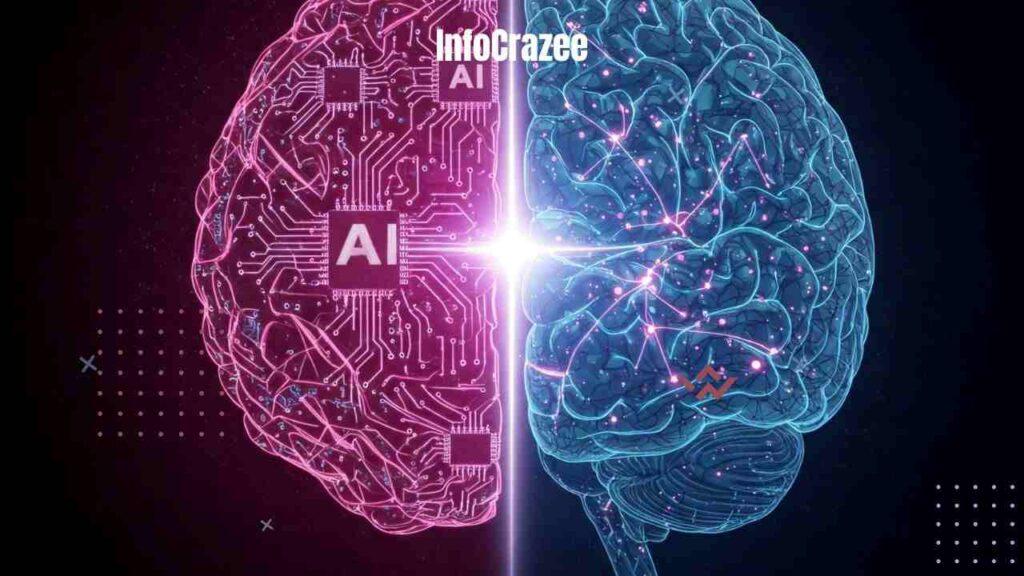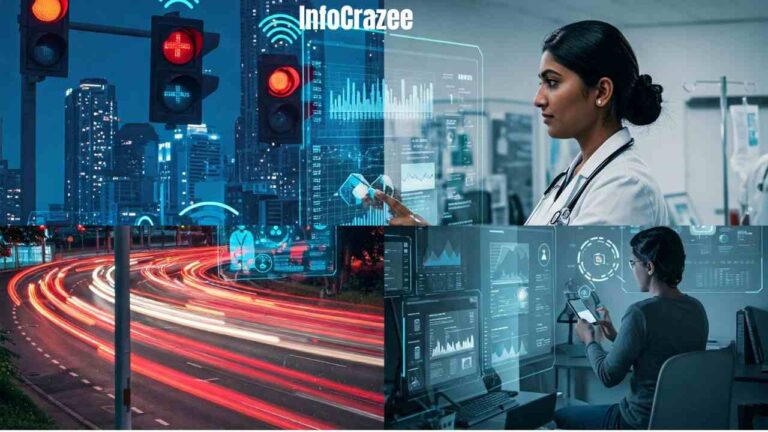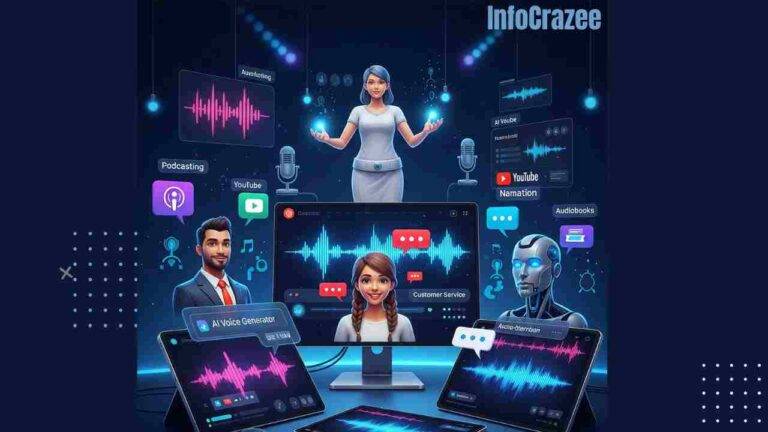AI vs. Human Intelligence: Understanding the Key Differences
The idea of artificial intelligence (AI) taking over certain aspects of our lives can sound a bit like science fiction. But it’s becoming a part of our everyday reality! However, as AI advances, a natural question arises: How does AI compare to human intelligence? What exactly sets these two apart, and what makes each unique?
At infocrazee, we’re all about making complex topics easier to understand, so let’s break down the key differences between AI and human intelligence.
1. What is AI?
Before jumping into the comparison, let’s make sure we understand what we’re talking about when we say “AI.”
AI refers to machines or systems that are designed to mimic human behavior. Unlike humans, AI doesn’t have consciousness or emotions, but it can process data, learn from experience, and make decisions — all of which are characteristics of human intelligence, though in a different way.
2. The Basics of Human Intelligence
Human intelligence, on the other hand, is a product of the brain and is deeply connected to emotions, experiences, and consciousness. It’s not just about processing information; it’s also about reasoning, creativity, and making complex decisions that take into account personal values, ethics, and emotions.
What Makes Human Intelligence Unique?
- Emotional Understanding: Humans can recognize emotions and empathize with others. We can feel joy, sadness, and everything in between, which influences our decision-making.
- Creativity and Innovation: Humans can come up with completely new ideas, think outside the box, and invent things that have never been seen before.
- Adaptability: Humans can learn from a wide range of experiences, adjusting to new environments, challenges, and problems without needing to be reprogrammed.
3. AI’s Strengths: Fast, Efficient, and Consistent
AI is, without a doubt, incredibly powerful. But while it doesn’t possess emotions or creativity, it excels in many other areas. Here’s what sets AI apart:
AI’s Key Strengths
- Speed and Accuracy: AI can process massive amounts of data in an instant. For example, AI can analyze hundreds of medical images to detect potential issues, all in a fraction of the time it would take a human.
- Consistency: Unlike humans, AI doesn’t suffer from fatigue or emotional swings. It performs the same task in the same way every single time, making it highly reliable for repetitive tasks.
- Automation: AI can automate processes, from scheduling meetings to controlling robots, saving humans a lot of time and effort.
4. Key Differences Between AI and Human Intelligence
So, now that we know what each is capable of, let’s dive into the key differences.

1. Learning and Adaptation
- Human Intelligence: Humans learn from experience, and we’re able to adapt based on emotions, surroundings, and context. This allows us to make complex, nuanced decisions.
- AI: AI learns from data. It’s great at recognizing patterns and can improve its performance over time. But it can only make decisions based on the data it has. AI doesn’t have intuition or “gut feelings.”
2. Creativity
- Human Intelligence: Humans can think creatively and innovate in ways that AI simply cannot. We can come up with new ideas and find unconventional solutions to problems.
- AI: While AI can generate content or ideas based on patterns, it doesn’t create new concepts in the same way humans do. It lacks the ability to think outside the box without guidance.
3. Emotional Intelligence
- Human Intelligence: One of the most defining features of human intelligence is the ability to understand and respond to emotions — both our own and others’.
- AI: AI doesn’t have emotions, and while it can recognize emotions based on data (like a chatbot detecting your frustration through your language), it doesn’t feel anything. It only mimics emotional responses.
5. Real-World Examples of AI and Human Intelligence in Action
Let’s bring these concepts to life with a couple of real-world examples.
AI in Action: Healthcare
AI has made huge strides in healthcare. For instance, AI systems can read medical images faster and with more consistency than human doctors. Some AI algorithms can spot patterns in data that might be missed by the human eye, which is a huge benefit for early disease detection.
However, the human touch is still crucial. A doctor’s ability to understand a patient’s personal experiences, emotions, and health history makes a difference in diagnosing and recommending treatments.
Human Intelligence in Action: Education
While AI-powered tools can provide personalized learning experiences and even grade papers, the emotional support and understanding that teachers provide can’t be replaced by machines. Teachers adjust their approach based on how students feel and adapt to the needs of each individual, something AI can’t replicate.
FAQs
Q1: Can AI replace human workers completely?
A: While AI can automate certain tasks, it’s unlikely to replace human workers entirely. AI excels at repetitive, data-driven tasks, but humans are needed for creativity, emotional understanding, and critical thinking.
Q2: Is AI getting smarter?
A: Yes! AI continues to improve through machine learning. It’s becoming more efficient at handling complex tasks, but it still lacks the depth of human understanding and emotional intelligence.
Q3: Can AI feel emotions?
A: No, AI doesn’t have emotions. It can analyze emotional data and respond accordingly, but it doesn’t experience feelings in the way humans do.
Final Thoughts
Both AI and human intelligence have their strengths, and they complement each other in incredible ways. While AI can process data faster and more accurately than humans, it’s the unique qualities of human intelligence — creativity, emotions, and the ability to adapt — that make us irreplaceable. The key is figuring out how we can work together to make the world a better place. And as technology continues to evolve, there’s no doubt that both AI and human intelligence will play an important role in shaping the future.
At infocrazee, we’re excited to continue exploring the world of AI and human intelligence, helping you understand how these technologies impact your life.






